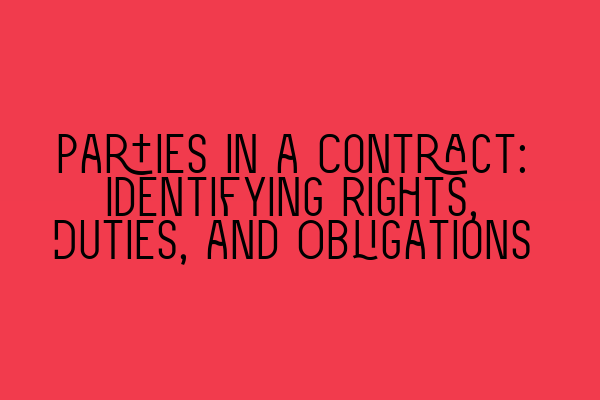Parties in a Contract: Identifying Rights, Duties, and Obligations
In the world of contract law, parties play a vital role. Whether you’re a solicitor, a law student preparing for the SQE exams, or simply someone interested in understanding the intricacies of contract law, it’s essential to have a clear understanding of the rights, duties, and obligations of parties involved in a contract. In this blog post, we will explore the various aspects of parties in a contract and how to identify their rights, duties, and obligations.
Before delving into the details, let’s have a brief overview of what a contract is. A contract is a legally binding agreement between two or more parties that sets out their rights and obligations. For a contract to be enforceable, certain elements must be present, such as offer, acceptance, consideration, intention to create legal relations, and capacity.
Now, let’s discuss the parties involved in a contract. Generally, there are two types of parties in a contract: the offeror and the offeree. The offeror is the party who makes the offer to enter into a contract, while the offeree is the party to whom the offer is made. However, in more complex contracts, there may be multiple parties involved, such as buyers, sellers, contractors, clients, and so on.
Each party in a contract has certain rights, duties, and obligations. Let’s break down these elements further:
1. Rights:
– Right to enforce the contract: Once a party has entered into a contract, they have the right to enforce the terms of the contract against the other party.
– Right to performance: Parties have the right to demand performance of the contract according to its terms. This means that if one party fails to fulfill their obligations, the other party can seek remedies or damages.
– Right to receive consideration: Consideration is an essential element of a contract, and each party has the right to receive the agreed-upon consideration for their performance.
2. Duties:
– Duty to perform: All parties in a contract have a duty to perform their obligations as specified in the contract. Failure to fulfill these duties may result in a breach of contract.
– Duty of good faith: Parties have a duty to act in good faith and deal with each other honestly and fairly. This duty implies that parties should not engage in fraudulent or deceptive practices.
– Duty to mitigate damages: In the event of a breach of contract, parties have a duty to mitigate their damages. This means they must take reasonable steps to minimize their losses.
3. Obligations:
– Obligation of confidentiality: In certain contracts, parties may have an obligation to keep certain information confidential. This obligation ensures the protection of sensitive or proprietary information.
– Obligation to indemnify: Some contracts may include an obligation to indemnify, which means that one party agrees to compensate the other party for any losses or damages incurred.
– Obligation to provide notice: Parties may have an obligation to provide timely notice in case of any changes, disputes, or breaches of the contract.
Identifying the rights, duties, and obligations of parties in a contract is crucial for effective contract management and enforcement. It allows parties to understand their roles and responsibilities and ensures that the contract operates smoothly.
If you’re preparing for the SQE exams, it’s essential to have a solid understanding of contract law. To enhance your preparation, make sure to check out our related articles:
1. SQE 1 Practice Exam Questions – Test your knowledge with our practice exam questions and get a better grasp of contract law.
2. SQE 1 Practice Mocks FLK1 FLK2 – Take our practice mocks to simulate the real exam scenario and assess your understanding of contract law.
3. SQE 2 Preparation Courses – Explore our comprehensive preparation courses for SQE 2, including specific modules on contract law.
4. SQE 1 Preparation Courses – Dive into our SQE 1 preparation courses, where you can gain in-depth knowledge of contract law and other key subjects.
5. SRA SQE Exam Dates – Stay updated with the upcoming exam dates for the SQE exams, so you can plan your preparation accordingly.
By understanding the rights, duties, and obligations of parties in a contract, you can navigate contract law with confidence. Whether you’re a solicitor, a student, or someone interested in the legal field, grasping these concepts will undoubtedly prove beneficial in your professional journey. So, dive into the world of contract law, study hard, and become a master at identifying the rights, duties, and obligations of parties in a contract.
